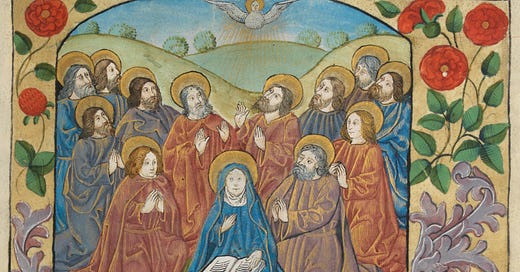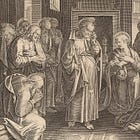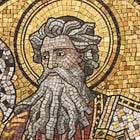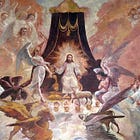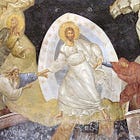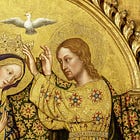How Our Lady felt on the Day of Pentecost – Fr H.J. Coleridge SJ
Pentecost marks the promulgation of the New Covenant. What did the Blessed Virgin Mary feel about the 3,000 new Christian converts baptized that day?
Editors’ Notes
On the Day of Pentecost, how did Our Lady help St Peter, the Apostles and the 3,000 new converts baptised that day?
Fr Henry James Coleridge SJ gives us his thoughts in a chapter from Mother of the Church – Mary During the First Apostolic Age.
From
Mother of the Church – Mary in the First Apostolic Age
Our Lady and the Day of Pentecost
The prayer of our Lord for the Gift of the Holy Ghost
Our Blessed Lord speaks,[1] in the discourse after the Last Supper, of His asking the Father that He would send the Holy Ghost, the Paraclete, as well of His own sending the same Divine Person.
Our theology teaches us that the Mission of the Holy Ghost was a joint act both of the Father and of the Son. The meaning of the language of our Lord as to asking the Father seems to be that He had purchased by His merits in His Human Nature the great boon of the Mission of the Holy Ghost, which was in this respect unlike His own Mission as the Son of God in His Incarnation.
There had not been, and there could not have been, in the Incarnation, any merit preceding, by virtue of which it might have been won from God. Whereas, in the case of the Mission of the Holy Ghost, our Lord’s own merits had preceded and furnished a title by which that Mission might be granted, not out of simple mercy and compassion alone, but also as an act of justice.
And when our Lord mentions that He will ask the Father, He refers to a solemn act by which in His Sacred Humanity He begged this grace of the Father, by virtue of the merits of His Life and Passion.
This solemn act must have taken place in Heaven during the ten days which intervened between the Ascension and the fulfilment of the days of Pentecost, and we cannot doubt that the Blessed Mother was allowed to be aware of this petition of her Divine Son, and enabled also to accompany it, in her own way and measure, by the most fervent prayer and supplication.
She may also have known when the appointed time was come for the Descent of the Holy Ghost, and indeed it seems to have been known, by some Divine instinct, to the little body of the faithful that Something great was about to happen, when they assembled themselves as of one accord on the Day of Pentecost.
The gift internal and external
The great boon of this new presence of the Holy Ghost, with His gifts and fruits and the powers which were thereby conveyed to the souls of the faithful in various degrees, according to the capacity and merits of each, was internal.
It might have been communicated, as His gifts are now communicated, without any exterior manifestation by which the Divine action might be recognized. But it was not so to be in the dispensation of the Incarnation.
At our Lord’s own Baptism, and on the occasion of the Transfiguration, there had been some external sign by which the descent of the Holy Ghost upon Him had been made known to St. John and to the three disciples on the holy mountain.
And there may have been many Divine reasons why something of the same kind should accompany the descent of the Holy Ghost upon the Visible Church of God on those great occasions. He usually acts silently and imperceptibly, but it was well that there should be something now to mark His presence, in harmony with the general economy of the Incarnation, and that this should contain a sign which might instruct men as to the purpose for which this presence of His was now vouchsafed.
All these conditions are found in the circumstances of His descent on the Church on the Day of Pentecost.
The sound as of, “a mighty wind coming” must have been heard in the city by others as well as by the Apostles and their companions, and must have been the means of bringing to the spot the crowd which was immediately addressed by St. Peter.
The tongues of fire were significant as pointing out the individual and personal character of the gifts now bestowed, which could not have been gathered so well from the sign of the rushing wind. The tongues also signified the purpose of the presence of the Holy Ghost in the members of the Church, as it is said in the Pentecostal hymn:
Linguis ut essent proflui,
Et caritate fervidi—
that they were to be animated by the most fervent charity, and that they were to communicate the truths which they had to deliver to the world by means of speech.
Faith was to be the condition of salvation, and faith was to come by hearing, and hearing by the Word of God.
Our Lady at Pentecost
Christian art has always delighted to paint the Blessed Mother of God in the midst of the Apostles on the Day of Pentecost, and there can be no doubt that this pious instinct represents both the truth of the fact and the tradition of the Church.
Although she could have no part in the preaching of the Word of God, Mary was to receive on this great occasion a measure of the blessing now accorded to the Church, which was altogether singular and unique.
For the presence of the Holy Ghost was conferred on the hearts and souls of the faithful there assembled, in proportion to the fitness of each for the reception of greater or lesser measures of grace, and in this sense the words of our Lord came true on this occasion, that ‘‘to him that hath shall be given, and he shall have more abundantly.”
According to this tule, the share of our Blessed Lady would be far greater than the shares of all the rest together in the increase of sanctifying grace.
Effects of interior grace
The Church believes that at this time the Apostles were confirmed in grace, as well as filled with the gifts and powers of the Holy Ghost, whether in order to their own sanctification, or to the discharge of their great office to souls, in proportion to the immense graces which they had already received from the free bounty of God, and on account of their own faithful cooperation.
Our Lady was confirmed in grace, as it is natural to think, long before this moment, and her graces of the order of sanctification were in proportion to nothing less than the dignity of the Mother of God and the close companion of our Lord throughout the whole of His Life, as well as to her cooperation, which had been proceeding without any rest or pause from the first moment of her sanctification at the time of her Immaculate Conception.
Moreover, if we consider as certain that she was left on earth for the particular purpose of assisting the Church in those first beginnings, in some specially powerful manner, as its Mother, in fulfilment of the word which had been spoken to her from the Cross by her Divine Son, it is clear that we must also suppose as certain that, in accordance with the ordinary rule of the action of God in such cases, Mary was endowed with special graces for the perfect execution of the office which that word conferred upon her.
The office of Our Lady
This office in many respects passed beyond that which she had always exercised as the most faithful disciple and scholar of our Lord, and as, His constant assistant in the course of His Public Life.
If the Apostles were the Fathers of the Church, as St. Paul speaks of himself in relation to his converts, our Lady was the Mother of all the faithful.
The mother’s office has not the authority of the father. It is an office of influence and affection, although it involves duties both on the mother’s side and on the children’s side.
But it has a very wide range indeed, and a character of its own, a character of immense charity, of endless watchfulness, of the most tender and self-sacrificing care, of indulgence, and sympathy, of an instinctive sense of whatever is dangerous or helpful to the children, and of boundless compassion for their weaknesses, and even for their failings, and mistakes, and misfortunes.
When the child is in trouble, the mother does not think of the faults by which the misery has been incurred, but of the misery itself. She leaves the question of justice to the father, or rather she pleads with all her power in bar of the strictest justice.
Her zeal for souls
Again, our Blessed Lady never lost the impression of Calvary, not only in her tender sense of the enormous sufferings of our Lord, but in the new and deep penetration with which it armed her as to the value of the souls for which so great a price had been paid, and in her most burning zeal for the secure and efficient application to them of the full merits of the Precious Blood.
The effect, on the saints of God, of the constant contemplation of the Passion, is not only the deepest contrition and compassion, but the most intense charity.
This truth must never be forgotten in our considerations as to our Blessed Lady after the Passion, which wrought a far greater increase of yearning for the salvation and perfection of souls in her, than it could work in all the saints together.
Now that she was left on earth, as we have said, especially for the sake of the souls whom her presence might help in so many wonderful ways, now that her heart was all aflame for the execution of her commission, and now that the great gift was sent from Heaven which was to fit the members of the Church for their various duties in the great work of the Gospel, it is natural to think that Mary must have received some very magnificent dower of the graces of the Holy Ghost to enable her to discharge her own tender and noble work.
External incidents of Pentecost
The description of the external incidents of the Day of Pentecost belongs rather to the history of the Church as a body than to that of Mary. But her great part in the whole mystery can never be omitted, without making the history of the Church incomplete.
The first external incident seems to have been a great manifestation of the presence of the Holy Ghost in the kind of ecstatic delight and joy, passing from the soul to the body, which took possession of the whole collected body of the Apostles and disciples. They broke out into praises of God, thanksgivings, expressions of adoration, and the like, and in these it became evident that their thoughts and words were not their own, and that they were even speaking in new languages.
Their holy tranquil enthusiasm was something altogether unearthly, and they became scarcely masters of themselves in their joy, and in their expression of it. The noise of the wind, and perhaps other portents, seem to have drawn the multitude of which the history speaks to the neighbourhood of the Cenacle, where there must have been some open space capable of receiving so large a crowd.
It is clear that there must have been a reason for their collecting, and the fact that the disciples were talking in various tongues, or even had the fiery tongues visible over them, could not have become known of itself all over the city.
St Peter’s speech
When the multitude was collected, St. Peter made his speech, as St. Luke relates.
It is characteristic of this speech, as of others contained in this history, that there is no argument at all used to prove the truth of our Lord’s Resurrection except that of the witness of the Apostles, illustrated, indeed, by the prophecy of David in the Psalms. St. Peter explains that the marvels which his audience witnessed were but the fulfilment of other prophecies about the outpouring of the Holy Ghost.
But the pith, so to say, of his speech is contained in the words:
“This Jesus hath God raised up again, whereof all we are witnesses. Being exalted therefore by the right hand of God, and having received of the Father the promise of the Holy Ghost’’—that is, the Holy Ghost Who had been promised—‘‘He hath poured forth this which you see and hear.”[2]
There is one circumstance in the scene which must have been providentially ordered for a special purpose.
The feast of Pentecost, like the other two great feasts of the Jewish calendar, would certainly always attract to Jerusalem a large number of Jews resident in foreign countries.
In this respect there would be no difference between the feast of Pentecost and the others. But it is certainly remarkable that on this occasion the crowd which was collected to hear the Apostles is said to have been made up in great measure of these foreign Jews, rather than of the inhabitants of Jerusalem or of the Holy Land.
When we think of the crowd which assembled outside the Praetorium at the Passion to force on Pilate the execution of our Lord, we think of them as Jews of Jerusalem and Palestine, rather than as foreigners. Here we have a crowd of foreigners, and St. Luke gives us a long list of the different parts of the world to which they belonged.
The miracle of the tongues would be unintelligible without this, and we must therefore consider it as a divinely ordained circumstance that so many of these foreigners should have met at the spot outside the Cenacle.
Miracle of the tongues
It appears probable that the miracle of the tongues was wrought in the way in which similar miracles have been from time to time wrought in the subsequent ages of the Church.
That is, the Apostles spoke in their own language, and the words fell on the ears of the hearers in the language to which they were accustomed. Otherwise, it is clear, there might possibly have been very great confusion, if one Apostle spoke one language for one set of foreigners, another for another, and so on.
There was also present a large body of Jews of Jerusalem and the Holy Land, as would seem from the exordium of St. Peter’s address.
Afterwards, when he speaks to the ‘‘men of Israel,” it would seem that he included the foreigners. And at the end of the whole, when he exhorts them to receive Baptism, he says, ‘‘The promise is to you and to your children, and to all that are far off, whomsoever the Lord our God shall call,’’[3] words which seem to include the Gentiles as well as the Jews ‘‘of the dispersion.”
Thus at the very outset of the preaching of the Church, there was a foreshadowing of what St. Paul calls the mystery, ‘‘which in other generations was not known to the sons of men, as it is now revealed to His holy Apostles and prophets in the Spirit, that the Gentiles should be fellow-heirs, and of the same body, and co-partners of the promise in Jesus Christ by the Gospel.”[4]
The accomplishment of this mystery was to be, as we shall see, to the minds of the first faithful, a novelty of the most astounding character, and it is well to note in the earlier stages of the history the succession of hints and sayings by which their minds were prepared for the disclosure.
Our Lady’s prayer
Christian contemplatives will see in all these circumstances of the great outpouring of the Holy Ghost on the Church and her children, most abundant matter for the unceasing and most heavenly thanksgiving and prayer in which it was our Blessed Lady’s special office to occupy herself, on occasion of the great mysteries of salvation, as they succeeded one another in the Life of our Lord and in the subsequent history of His Kingdom.
No one could understand as she could the immensity of the boon which was conferred on the world, or see, as she could, the promise of the future glories of the Church in the marvellous incidents of that glorious morning.
The efficacy of the Apostles’ preaching, the blessing which attends the Word of God, the interior movements of the Holy Spirit in the hearts alike of preacher and hearers, the wonders of conversion, the grace of Baptism, the formation of the believers into one Body under the rule of the appointed ministers, the spread of these blessings into all the lands from which the multitude had been collected, and beyond them, over the whole world, the admission of all the nations among which these Jews were sojourners, and of the whole race of Adam, to the fruits of the Incarnation and Passion, all the heights of interior sanctity to which men were to be raised by the indwelling of the Holy Ghost, and the mighty achievements of the servants of God and the glories to which they would lead—all were calmly and devoutly counted over in the mind and heart of Mary.
Circumstances omitted in the Acts & Mary’s care for the converts
It is natural to think that there must have been a great number of circumstances on which St. Luke does not linger.
Each one of the converts had a history, each one was the object of a peculiar tenderness on the part of her who had been made the Mother of all.
There must have been some short course of instruction at which the Apostles and disciples must have laboured, perhaps with the help of the holy women and of our Blessed Lady in the case of converts of their own sex.
There must have been the first solemn administration of Baptism to numbers at a time, and then the preparation of the newly baptized for the reception of other sacraments, Penance, Confirmation, the Blessed Eucharist.
There must have been the blessed beginning of what was never to cease throughout all ages in the Catholic Church, the assembling of the faithful in crowds, as far as circumstances allowed, to hear Mass, and the holy and joyous scene of general Communion.
And growing out of all these, there must have been, under the eyes of our Blessed Mother, the instruction and formation of a Christian community, thoroughly penetrated by the spirit of, charity and mutual love, a glorious anticipation of the worldwide Church in every age and in every land.
The beginnings of the Christian society
It must be remembered that, in such works of God as the formation of Christian society, although there are developments and phases which naturally come later in the history, there is always at the very first a very peculiar outpouring of grace, the fruits of which have a beauty and purity all their own.
The Church was to grow in external amplitude and power, and by the side of the proportions of her later greatness the infant community at Jerusalem may seem insignificant.
But nevertheless we are justified in thinking that in the intensity of their charity and union, as in other points for which the highest spiritual perfection is required, the first members of the Church of Jerusalem have seldom been surpassed, or even equalled.
The simple modest words of St. Luke are enough to be made the foundation of long meditations on this early springtide, this sudden tropical burst of beauties and glories, which made it at once more like the ripe maturity of a splendid summer. ‘‘They were persevering in the doctrine of the Apostles,” that is, they fed them- selves continually on the Word of God, as set before them by the appointed teachers of the Church.
“And in the communication of the breaking of bread, and in prayer,” that is, in the frequentation of the sacraments, attendance at the Holy Sacrifice, and in the praises of God and prayer to God, public as well as private.
For it was understood in the Church from the very first that Christian prayer, public and private, was to be the great ordinary and appointed instrument by means of which the blessings of grace were to be obtained for all.
St Luke’s description
Having said this, the Evangelist next subjoins a few words which describe the external position of the Church and the Apostles, of which we may have to say more in another chapter.
“Fear came on every soul, and many wonders and signs were done by the Apostles in Jerusalem, and there was great fear on all”—the holy loving fear which is produced on simple pure hearts when they feel that God is close to them, around them on every side, and within them.
Then comes the external fruit of the true spirit of charity among the faithful.
‘‘And all they that believed, were together, and had all things common. They sold their possessions and goods, and divided them to all, according as every man had need.
And continuing daily with one accord in the Temple, and breaking bread from house to house,” for the celebration of the Christian Mysteries could not take place ordinarily in public, “they took their meat with gladness and simplicity of heart, praising God, and having favour with all the people,” for the jealousy of the priests was not yet aroused, and the beauty of the Christian character could not but attract love.
‘‘And the Lord added daily to their society such as should be saved.’’[5]
This description only requires to be expanded in meditation, in order to give us an account of the many new subjects of thanksgiving and intercession which must have crowded upon the loving heart of Mary, in consequence of the doings of this glorious Day of Pentecost.
The obedience to the Church, the fruitfulness of the instructions of her prelates and of the sacraments and other means of grace which they administered, the pure fire of charity working out its blessed effects on the hearts and in the lives of the infant community, the attitude towards that community of the world outside, the Temple authorities, and the people at large, and, above all, the daily accession to the Church of new children, young in the faith and in the practice of Christian virtue, and exposed to many temptations and dangers of which they had little thought—all these things must have passed through the mind of the Blessed Mother and have risen up to Heaven on the incense of her prayer.
It was indeed a beautiful spring-time, the promise of which needed much intercession to strengthen it for endurance unto the harvest.
Devotion of the new Christians to Our Lady
Nor must it be omitted, that if the crowd of new children added to the Church awakened in the heart of Mary a most intense motherly love and care for their right nurture and education in the holy law to which they had become subject, there must also have been, on their part, a very great and eager desire to see and converse with the Mother of their Saviour, Whom great numbers of these new disciples had probably never seen. This was a part of the office of Mary in that infancy of the Church, a part of the immense benefit which those first Christians derived from her presence among them, that she represented far more perfectly than any one else could represent, the character, the personal presence, the ways of thought and look and speech and action of her Divine Son.
While she was with them, our Lord was reflected among them in a manner and degree which could never be quite perpetuated afterwards, and that gracious Lady, with all her recollection and love of retirement and of solitude with God, would not deny to those youngest members of the great family the satisfaction of their pious cravings, from which they might derive so much light and strength for the conflicts to which they were so soon to be exposed.
The mere presence or nearness of our Lord, even at such times as when He was asleep in the boat, were virtually a great help and a great joy, and a great encouragement to His disciples. Now He was in Heaven, no more to be seen ordinarily by mortal eye, although He was still present among them in the Blessed Sacrament.
But the Apostles and all the faithful had in our Blessed Lady a living and speaking image and picture of her Son, and it is impossible to imagine the extent to which they found in this a resource, a comfort, a joy, and a protection against all troubles and assaults.
From The Mother of the Church: Mary During the First Apostolic Age – Fr Henry James Coleridge SJ
HELP KEEP THE WM REVIEW ONLINE!
As we expand The WM Review we would like to keep providing free articles for everyone. If you have benefitted from our content please do consider supporting us financially.
A subscription from you helps ensure that we can keep writing and sharing free material for all.
Plus, you will get access to our exclusive members-only material!
Thank you!
Further Reading
See also: The WM Review Coleridge Archive
[1] St. John xiv. 16
[2] Acts ii. 33.
[3] Acts ii. 39
[4] Ephes. iii. 5,6.
[5] Acts ii. 47.

